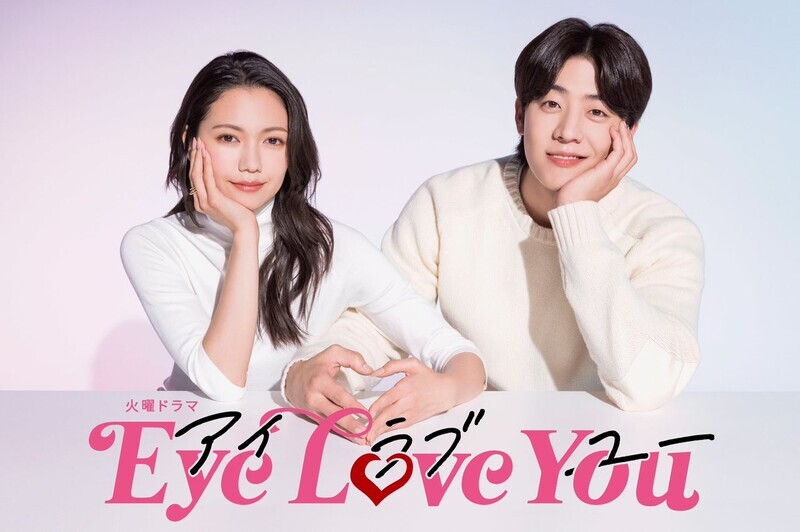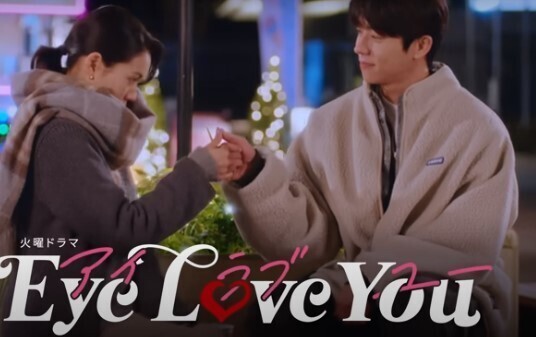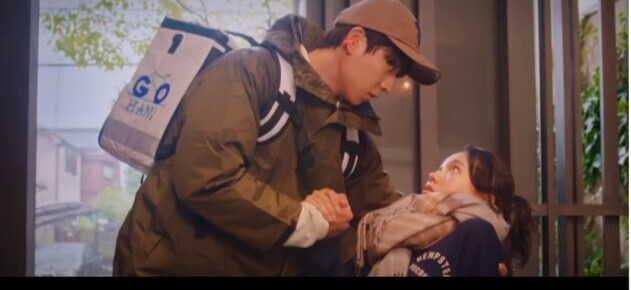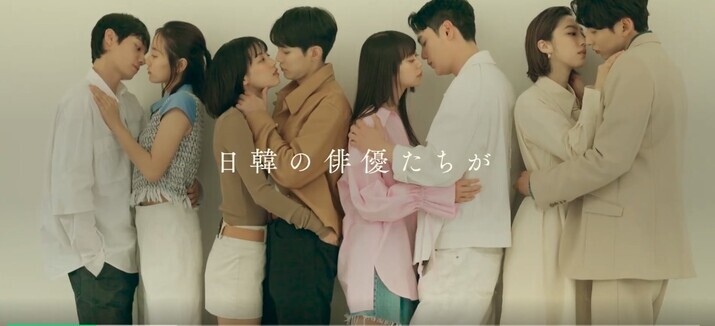hankyoreh
Links to other country sites 다른 나라 사이트 링크
The dream K-drama boyfriend stealing hearts and screens in Japan

He texts each morning, “Did you have a good night’s sleep?” He asks, “Are you cold?” He’s always checking in, asking you how your day is going. He sends pictures of himself making delicious meals. He has no qualms in expressing his interest, as can be seen in how he initiates dates and the charming way he asks if you’ve gotten even prettier while he was away.
As unpredictable as he is, he still makes your heart flutter. Say hello to Yoon Tae-oh, the perfect amalgam of every K-drama’s leading man.

Only the best parts of every leading man in Korean dramas
“Eye Love You,” a primetime Tuesday drama airing on Japanese broadcasting company TBS, is attracting much attention for its sweet love story between Yuri Motomiya, a Japanese woman played by Fumi Nikaido, and Yoon Tae-oh, a Korean man played by Chae Jong-hyeop.
The series allows viewers to vicariously experience romance with someone who looks like they’ve walked straight out of a Korean TV series.
When Tae-oh, who is described as “sweet, brave, tall, physically fit, but with a dashing smile,” actively demonstrates his interest in Yuri, the drama became the No. 1 trending topic on X Japan (formerly Twitter) on Jan. 23, the day it premiered.
From its planning stage, the series was created with the intention of making people experience romance by proxy. With a Korean employee of TBS serving as the show’s producer, they managed to incorporate what Japanese people like about the way that Koreans approach dating.
“Many Japanese women are interested in dating Korean men, so we want to play out those fantasies through this series,” said Cha Hyun-ji, a producer in the broadcaster’s business investment strategy department, in an interview with TBS in January.
Casting the first Korean actor to play a male lead in a primetime Japanese TV series was also done for the effect of making the show feel all that more real in its wish-fulfillment.
“When we were looking at who to cast, we had to consider whether the actor had the characteristics that would make him lovable to a Japanese audience,” said Cha. “I’d show Japanese women photos of the actors and see how they reacted whenever I had the chance.”
This trend can be seen across all genres. Netflix Japan’s 2023 reality dating show, “Love Like a K-Drama” and the 2022 series “Heart Signal Japan” — the Japanese version of the Korean reality dating show “Heart Signal” — both showed Japanese women enjoying the thrill of romance while staying in Seoul with Korean men.

How the fourth Korean Wave changed J-dramas
Fantasies surrounding romances with Korean partners have been present in Japan since the appearance of “Yonsama,” the nickname for actor Bae Yong-joon, in the 2003 TV series “Winter Sonata.”
“In the past, these fantasies belonged to more middle-aged people, and were perceived as unattainable,” Japanese culture critic Kim Bong-seok explained. “Nowadays, Gen Z is more focused on the ordinary ways in which relationships develop in people’s daily lives.”
The fourth Korean Wave, which gained momentum after the COVID-19 pandemic and spread its influence thanks to online streaming services, has been leading these newfound changes.
The new wave is about being frequently exposed to Korean content, and as such, embracing Korea unapologetically — people don’t only show interest in its pop culture, but what’s trending in the realms of beauty, food and fashion.
Since 2021, the #KoreanVibes (“kankokuppo”) has been trending on Japanese social media, and Japanese companies have been marketing in Korean.
This phenomenon has also changed Japanese television.
While past Japanese dramas such as Fuji TV’s “Hard to Say I Love You,” which featured K-pop star Kim Jae-joong as one of the main protagonists, only concentrated on putting Korean idols at the forefront, “Eye Love You” emulates Korea wholeheartedly, in just about every aspect.
The series itself mirrors the many cliches and characteristics of K-dramas. The story has various subplots while remaining fast-paced, and objects such as rings made of ribbons and gestures like pinky promises are inserted to make people swoon, much like the famous candy kiss scene in the 2012 TV series “Iris.”
Korean cuisine, such as japchae glass noodles and sundubu soft tofu are crucial mediums that bring the two protagonists closer together.
There are also many scenes explaining Korean customs. After a company dinner, Tae-oh asks Yuri if she wants to go get ice cream with him. He then explains the hidden meaning behind such actions, saying, “When a Korean guy asks a girl to get ice cream with him, it means that he’s attracted to her and wants the two of them to be alone.”
“Korean culture is being reflected in media all over the world, but this is the first series that deals with the fantasy of romantic relationships with Koreans,” said Kim Seok-ki, the head of the programming team at Channel J, a channel specializing in Japanese content.
“The reason Japanese people are particularly interested in romantic relationships with Koreans is because of the huge cultural differences between Korea and Japan,” he said.
Such cultural differences lie at the heart of this series, and also what makes it more interesting.
A Korean woman in her 40s who works in Japan said, “In Japan, we only call each other by our first names when we’ve become close, but Tae-oh calls Yuri by her first name as soon as he meets her. It seems that his gutsiness, which comes from cultural differences, is what people find endearing.”

Chae Jong-hyeop’s loveable boyfriend act makes him a new Korean Wave star
A new Korean Wave, reliant on empathy and understanding, has dawned. Instead of berating Tae-oh for being impolite, viewers are studying the behaviors and characteristics of Korean people to understand him in more depth.
Some viewers said that they looked for what Koreans meant when they pretend to undersell gift-giving, as can be seen in the scene in which Tae-oh says that he “just picked these up from the street” when he gives Yuri flowers.
We can see how accepting the generation of this new Korean Wave is toward accepting unfamiliar cultures in the way that they try to respect and understand certain quirks and behaviors, instead of needing everything to be absorbed into one homogenous culture.
Maidona News, a Japanese media outlet, reported, “Many viewers are learning Korean to understand what is being said in the TV series.”
The series’ strategy of not providing subtitles for Tae-oh’s thoughts, which are in Korean, has successfully stimulated people’s interest in the language itself.
Content explaining what the Korean in the show means appears often on Japanese social media.
With a relatively unknown actor taking the lead role in a Japanese TV series, a new Korean Wave star, who is gaining popularity for his approachability and being top-tier boyfriend material, has been born. Actor Chae Jong-hyeop is affectionately being called “Hyeop-sama” and “Hyeop-kun.”
“There are many interesting cross-cultural points that can be seen when Korean and Japanese cultures overlap. In the era of global content, a work that shows various aspects of difficult cultures is very meaningful,” assessed Jung Duk-hyun, a pop culture critic.
However, there are also concerns surrounding the fact that the series may create generalizations about Korean men by only highlighting the best qualities of male leads in Korean TV series in order to satisfy consumer fantasies.
By Nam Ji-eun, staff reporter
Please direct questions or comments to [english@hani.co.kr]

Editorial・opinion
![[Column] Life on our Trisolaris [Column] Life on our Trisolaris](https://flexible.img.hani.co.kr/flexible/normal/500/300/imgdb/original/2024/0505/4817148682278544.jpg) [Column] Life on our Trisolaris
[Column] Life on our Trisolaris![[Editorial] Penalties for airing allegations against Korea’s first lady endanger free press [Editorial] Penalties for airing allegations against Korea’s first lady endanger free press](https://flexible.img.hani.co.kr/flexible/normal/500/300/imgdb/original/2024/0502/1817146398095106.jpg) [Editorial] Penalties for airing allegations against Korea’s first lady endanger free press
[Editorial] Penalties for airing allegations against Korea’s first lady endanger free press- [Editorial] Yoon must halt procurement of SM-3 interceptor missiles
- [Guest essay] Maybe Korea’s rapid population decline is an opportunity, not a crisis
- [Column] Can Yoon steer diplomacy with Russia, China back on track?
- [Column] Season 2 of special prosecutor probe may be coming to Korea soon
- [Column] Park Geun-hye déjà vu in Yoon Suk-yeol
- [Editorial] New weight of N. Korea’s nuclear threats makes dialogue all the more urgent
- [Guest essay] The real reason Korea’s new right wants to dub Rhee a founding father
- [Column] ‘Choson’: Is it time we start referring to N. Korea in its own terms?
Most viewed articles
- 160% of young Koreans see no need to have kids after marriage
- 2New sex-ed guidelines forbid teaching about homosexuality
- 3Presidential office warns of veto in response to opposition passing special counsel probe act
- 4Months and months of overdue wages are pushing migrant workers in Korea into debt
- 5[Guest essay] Maybe Korea’s rapid population decline is an opportunity, not a crisis
- 6OECD upgrades Korea’s growth forecast from 2.2% to 2.6%
- 7[Column] Life on our Trisolaris
- 8Bills for Itaewon crush inquiry, special counsel probe into Marine’s death pass National Assembly
- 9Full text of press communique released at new round of six-nation
- 10Gangnam murderer says he killed “because women have always ignored me”